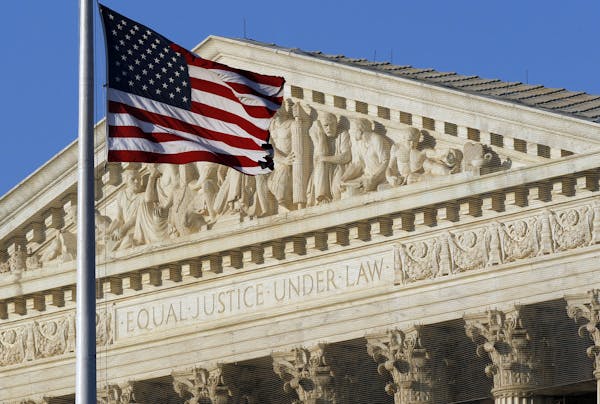There was a time when breast cancer was discussed in whispers. Mastectomies, hardly at all.
Not anymore.
Awareness of the disease and one of its most drastic treatment options rocked Facebook this week when the social media giant bowed to public pressure and allowed post-mastectomy photographs on the site.
Coming on the heels of Angelina Jolie's revelation that she had a preventive double mastectomy, talk of the very personal procedure has never been so public.
Yet some are wondering if the increased exposure is providing much-needed information or fueling hysteria about breast cancer.
"The pendulum may have swung a little bit too much from awareness to paralyzing fear," said Dr. Todd Tuttle, chief of surgical oncology at the University of Minnesota.
Breast cancer survivor Denise Blumberg-Tendle, of Plymouth, thinks otherwise. "I really believe knowledge is power," she said.
Without a doubt, breast cancer is a deadly disease. The American Cancer Society estimates that more than 234,000 Americans will be diagnosed with breast cancer this year, and 40,000 will die from the disease.
Research has shown, however, that women overestimate their risk of developing breast cancer, Tuttle said.
His own study revealed that when told they had a risk factor in one breast, women increasingly opted for preventive double mastectomies. The number of women choosing the procedure jumped 188 percent from 1998 to 2005.
"I worry that a lot of women may choose to do irreversible surgical procedures because of this unrealistic fear," he said.
Pressuring Facebook
The photos that spurred a New York cancer patient to petition Facebook — ultimately garnering more than 20,000 signatures on Change.org — are tasteful but jarring images taken by fashion photographer David Jay. He founded the SCAR Project to show the effects of breast cancer.
He posted a set of the photos on Facebook after Jolie's announcement, only to have Facebook remove them.
Scorchy Barrington, the woman battling Stage IV breast cancer who launched the petition, applauded Facebook's newly clarified nudity policy and emphasized the awareness raised by the SCAR Project.
"We want the world to know that breast cancer is not a pink ribbon — it is traumatic, it is life-changing, and it urgently needs a cure," she said in a written statement.
In announcing the policy, Facebook said that post-mastectomy photos have always been permitted, but nudity is not. The issue has come up before when the social network and its users sparred over breastfeeding photographs.
The new policy says "photos with fully exposed breasts, particularly if they're unaffected by surgery, do violate Facebook's terms. These policies are based on the same standards which apply to television and print media, and that govern sites with a significant number of young people."
How much is too much?
Even while Blumberg-Tendle, who works for the Susan G. Komen affiliate in Minnesota, applauds the conversation around breast cancer, genetic testing and treatment, she questioned the effectiveness of graphic photos, especially in an era when many people turn to the Internet after a diagnosis.
"Not everybody is ready to see something like that," she said. "When you start reading about every side effect and outcome, sometimes it's not healthy because it's almost too much information."
Dr. Farris Timimi, medical director of the Mayo Clinic Center for Social Media, hopes that striking images on social media will prompt patients to ask more questions of their doctors.
"Conversations are occurring between a provider and their patients that may not have occurred without that kind of knowledge and awareness," he said.
Karen Wilcox, an oncology nurse with Health East, agreed. She said online stories, images and discussions can spark important discussions about family health history before someone gets sick.
"Oftentimes that doesn't come up until it needs to, and then we ask the questions," she said.
Creating community
In addition to sparking conversation, social media can be a place for people to share their experiences and make connections online.
"When you get that diagnosis of cancer, your whole world is changed upside down," Wilcox said. "It helps that they can connect to others who have been through that journey."
Sher Noot of Roseville looked for pictures online before she had a double mastectomy and reconstruction a couple of years ago after being diagnosed with breast cancer.
"I think it satisfies curiosity," she said. "You want to know what it's going to look like."
Yet Noot said she would never share photographs of her own breasts. Still, she's surprised at how open the discussion of mastectomy has become. Some family members and friends have asked to see her reconstructed breasts.
"I say, 'If you didn't know them intimately before, you're not going to know them intimately now,' " she said, laughing.
But she's happy to speak with people who connect with her via CaringBridge, the site she used to share her treatment and recovery with family and friends.
Timimi of Mayo Clinic said that sense of online community has brought solace and strength to many struggling with breast cancer and the difficult choices it requires.
"Knowing that others face the same challenges and do so with dignity and courage — that's a powerful message for anyone to see and receive," Timimi said.
Katie Humphrey • 612-673-4758

Minnesota Sports Hall of Fame: A class-by-class list of all members

This retired journalist changed professional wrestling from Mankato

